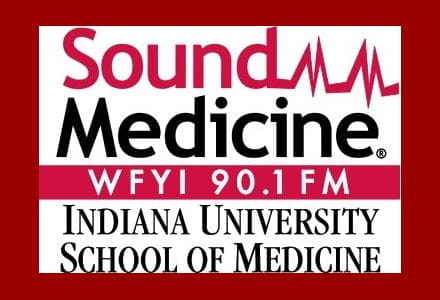INDIANAPOLIS — The award-winning “Sound Medicine” announces its program for Oct. 6, with a conversation about baby boomers and hepatitis C, flu shots, and pharmaceutical shortages affecting cancer patients.
Should baby boomers get tested for hepatitis C? David Crabb, M.D., visits “Sound Medicine” to discuss why all baby boomers should get tested for hepatitis C. Baby boomers account for three-fourths of all hepatitis C cases in the U.S. Dr. Crabb also recommends that those who inject drugs or share needles get tested as well. The screening is a simple blood test, and hepatitis C now can be cured 70 to 80 percent of the time. If left untreated, hepatitis C can lead to liver disease and damage. Dr. Crabb is the John B. Hickam Professor of Medicine at the Indiana University School of Medicine.
What is the “walking school bus?” As part of the federal “Safe Routes to School” initiative, many communities are starting “walking school buses.” The purpose is to encourage children to become more physically active and combat childhood obesity. Sandy Roob reports on the four walking school buses at St. Thomas Aquinas School in Indianapolis. Walking school buses are a group of children walking to school with adult supervision. Parent volunteers make several planned stops on the way to and from school each day to pick up the children. Anyone can start a walking school bus; all it takes is a schedule with planned routes, adult supervision and willingness to exercise.
Why should you get a flu shot? According to the Centers for Disease Control and Prevention, flu seasons are unpredictable in a number of ways. Lisa Grohskopf, M.D., a medical officer for the CDC influenza division, discusses the upcoming flu season and the different vaccine options available. According to Dr. Grohskopf, flu season starts in October, and consumers should get vaccinated as soon as possible.
How are drug shortages affecting cancer patients? According to a recent study by the University of Pennsylvania, 83 percent of oncologists have experienced shortages of cancer drugs that affected their ability to properly treat patients. Erin Fox, Pharm.D., visits “Sound Medicine” to discuss the reasons behind the shortages of injectable drugs. Dr. Fox is the director of the Drug Information Service at the University of Utah.
What role do pathologists play in patient care? Pathologists are doctors who study blood, fluid and tissue in order to make a diagnosis. Michael Misialek, M.D., the associate chair of pathology at Newton-Wellesley Hospital, believes that pathologists should be more involved in patient care and treatment and have a “seat at the table.” According to Dr. Misialek, pathologists should have more patient interaction because more than 70 percent of medical treatment is determined from lab tests. Dr. Misialek shares the story of a patient he diagnosed with breast cancer and how her visit to his lab initiated a movement toward patient interaction.
“The Waiting Room”: On Oct. 21, PBS will air the documentary “The Waiting Room,” which profiles Highland General Hospital in Oakland, Calif., a public hospital struggling to care for a largely uninsured community. The Washington Post listed it as one of the top 10 films of 2012, and it was shortlisted for an Academy Award. Director Pete Nicks discusses an exceptional nurse’s aide, the reasons for making the documentary, and what he learned during filming.
“Sound Medicine” covers controversial ethics topics, breakthrough research studies and the day-to-day application of recent advancements in medicine. It’s also available via podcast and Stitcher Radio for mobile phones and iPads and posts updates on Facebook and Twitter.
Co-produced by the IU School of Medicine and WFYI Public Radio (90.1 FM) and underwritten in part by Indiana University-Purdue University Indianapolis, “Sound Medicine ” airs on the following Indiana public radio stations: WBSB (Anderson, 89.5 FM), WFIU (Bloomington, 103.7 FM; Columbus, 100.7 FM; Kokomo, 106.1 FM; Terre Haute, 95.1 FM), WNDY (Crawfordsville, 91.3 FM), WVPE (Elkhart/South Bend, 88.1 FM), WNIN (Evansville, 88.3 FM), WBOI (Fort Wayne, 89.1 FM), WFCI (Franklin, 89.5 FM), WBSH (Hagerstown/New Castle, 91.1 FM), WFYI (Indianapolis), WBSW (Marion, 90.9 FM), WBST (Muncie, 92.1 FM), WBSJ (Portland, 91.7 FM), WLPR (Lake County, 89.1 FM) and WBAA (West Lafayette, 101.3 FM).
“Sound Medicine” is also broadcast on these public radio stations across the country: KOTZ (Kotzebue, Alaska), KSKA (Anchorage, Alaska), KTNA (Talkeetna, Alaska), KUHB (Pribilof Islands, Alaska), KUAF (Fayetteville and Fort Smith, Ark.), KIDE (Hoopa Valley, Calif.), KRCC (Colorado Springs, Colo.), KEDM (Monroe, La.), WCMU (Mount Pleasant, Mich.), WCNY and WRVO-1 (Syracuse, N.Y.), KMHA (Four Bears, N.D.), WYSU (Youngstown, Ohio), KPOV (Bend, Ore.) and KEOS (College Station, Texas) and High Plains Public Radio stations KCSE, KANZ, KZAN, KZNA, KJJP, KTXP, KZNZ and KTOT in Kansas, Oklahoma and Texas.
Please check local listings for broadcast dates and times.




